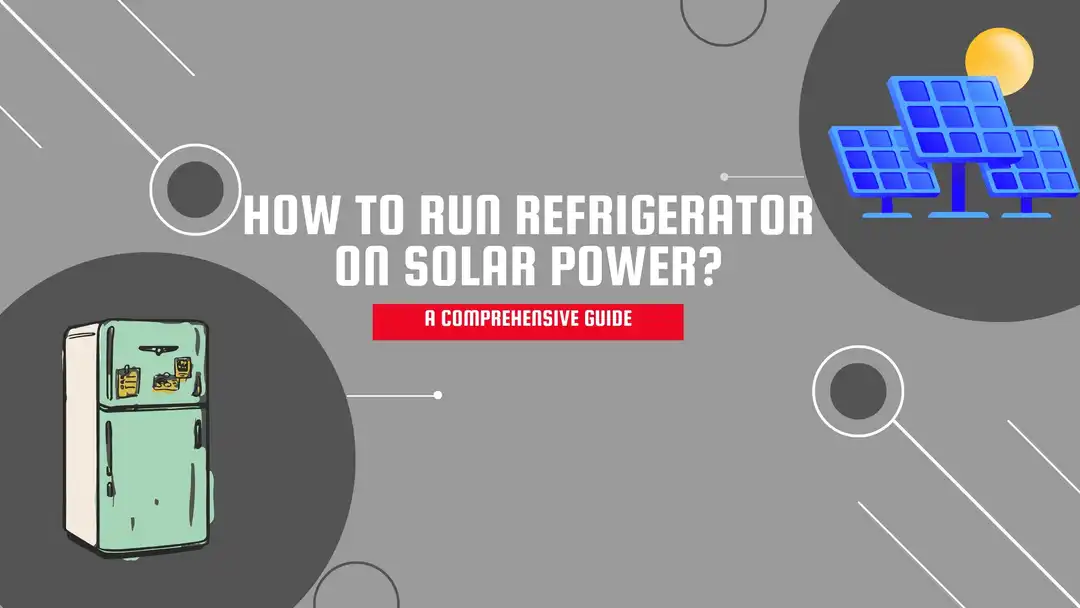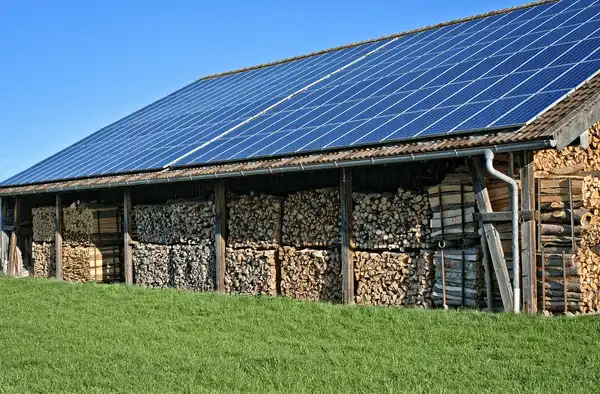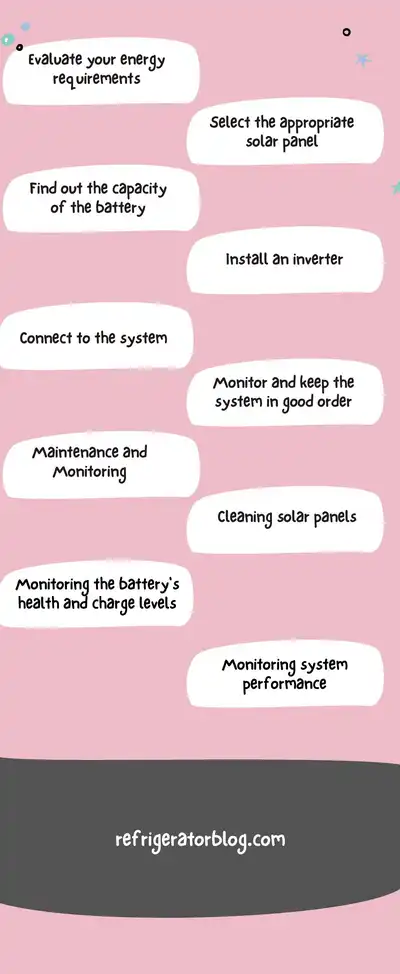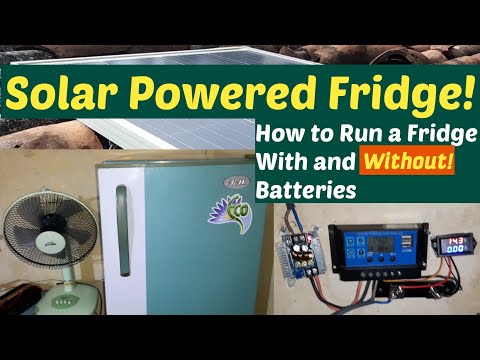In this day and age, where sustainability and energy efficiency are the top priorities, running appliances that run on renewable energy sources is becoming more and more commonplace. If you’re thinking of how to run refrigerator on solar power, then you’ve found the right resource. In this article, we’ll give you an easy-to-follow guideline for setting up an energy-efficient Solar-powered refrigerator. From understanding the advantages to deciding on the right equipment to ensuring that it is maintained efficiently We’ve got you covered.
Table Of Contents

Understanding Solar Power

Solar power is a fantastic source of energy that uses the sun’s rays to create electricity. It has seen a significant increase in popularity over the last few years because of its many benefits and environmental issues. When you know how solar power functions it is possible to appreciate the potential of solar power and discover its possibilities in a variety of aspects of your daily life.
How Does Solar Energy Work?
Solar power is generated by the sun’s radiation using solar panels or photovoltaic cells. It is a safe and renewable energy source that can be transformed into electricity that powers various appliances and devices.
You can find further explanation here – https://www.energy.gov/eere/solar/how-does-solar-work
How Is Solar Power Generated?
Solar panels absorb the sunlight and transform it to direct current (DC) electricity using the effect of photovoltaic. The DC electricity is transformed into alternating current (AC) electricity through an inverter. This makes it suitable for powering appliances.
Benefits of Running Your Refrigerator on Solar Power
Running your refrigerator or Fridge on solar power offers numerous benefits for both the environment and your wallet. Here are some key advantages:
Lower Electricity Costs : Utilizing solar energy, you can drastically reduce your monthly electric bill since your refrigerator is powered by solar energy.
Renewable and environmentally friendly : The Solar power source is a green and renewable source of energy. If you switch to a refrigerator powered by solar energy and reduce the carbon footprint of your home and contribute to a cleaner planet.
Power Independence : Solar power gives you independence from energy. You won’t be reliant entirely on the electricity grid which makes your home less susceptible to power interruptions and boosts the amount of energy you can use.
Long-term cost savings : While the initial cost of installation could be higher than the initial cost the operation of your refrigerator using solar energy could result in the long run cost savings because of decreased energy costs.
Harnessing the power of the sun to run your refrigerator not only benefits you personally but also helps protect the environment for future generations. It’s a win-win situation that combines convenience, savings, and sustainability.
How to Run Refrigerator on Solar Power?
Solar power offers a reliable and environmentally-friendly solution for powering your refrigerator. Here’s an overview of the procedure:

Step 1 : Evaluate your energy requirements
Before you dive into the realm powered by solar, it’s important to know your needs in terms of energy. Begin by looking at the power usage of your appliance. This information is usually printed on the label or in the manual for the appliance.
Step 2 : Select the appropriate solar panel
The selection of the right solar panels is vital to ensure a reliable system. Choose top-quality, durable panels that have sufficient capacity to generate energy to satisfy the demands of your refrigerator. Take into consideration factors like the wattage, efficiency ratings, and space available to install the panel.
Step 3 : Find out the capacity of the battery
To ensure an uninterrupted power supply for your appliances, you’ll require batteries to store power. Determine the capacity of your battery concerning your refrigerator’s power consumption, in addition to the other electronics or appliances that you intend to power with solar energy. It is advisable to talk with a professional to determine the best size of the battery to meet your requirements.
Step 4 : Install an inverter
Inverters are a vital component that converts direct current (DC) energy generated by solar panels and stored in batteries into the alternating current (AC) electricity that is required to provide power to your refrigerator. Check that the capacity of the inverter matches the power requirements of your home.
Step 5 : Connect to the system
Connect to the battery storage, solar panels, and inverter to follow the directions of the manufacturer. It is essential to follow the correct wiring protocols to ensure safe and effective operation.
Step 6 : Monitor and keep the system in good order
Monitor the performance regularly of your solar-powered refrigeration system to ensure maximum effectiveness. Clean your panels regularly check the batteries for signs of wear and deal with any repair or maintenance demands promptly.
Step 7 : Maintenance and Monitoring
Regularly scheduled maintenance and monitoring will ensure maximum performance and long-term durability that your fridge is powered with solar.
Step 8 : Cleaning solar panels
Clean the solar panels regularly to get rid of dust, debris, or any shade that could affect their efficiency. Follow the manufacturer’s guidelines on cleaning methods.
Step 9 : Monitoring the battery’s health and charge levels
Be sure to monitor the health of your battery and charge levels regularly. Conduct tests of capacity and voltage and replace batteries if needed.
Step 10 : Monitoring system performance
Monitor the system’s performance by using monitoring software or tools. Check battery status, as well as any error codes to spot and resolve issues quickly.
When working with solar power systems, it is crucial to prioritize safety to prevent accidents and electrical hazards. Ensure proper electrical safety precautions, such as wearing appropriate personal protective equipment and turning off power sources when making connections or modifications. Follow electrical codes and guidelines for grounding and wiring. Use appropriate grounding techniques and materials to protect against electrical faults and lightning strikes.
How Many Solar Panels Would Be Required to Run a Fridge?
How many solar panels you need depends on the type and size of your fridge. A large-sized French Door or Side-by-side refrigerator will have bigger power needs than a typical single-door fridge. Any refrigerator with added facilities such as an ice maker machine and a dispenser will need more watts of solar power than a fridge which doesn’t.
On average, if your refrigerator consumes around 60-100kWh amount of power per month, you may require 3-4 average solar panels to power your fridge if you’re planning to run it 24/7. On the other hand, if you want to run a 12V mini fridge, solar panels of 100-200 watts will provide enough power to run it. However, note that you can’t directly run a 12V fridge on a solar panel. First, you must power up a 12V battery with solar energy and then run your 12V fridge on the battery.
Let us give you an example to further clear the fog. Let’s say, your refrigerator uses 100kWh of electricity per month. Now, an average 100-watt solar panel will be able to supply the fridge with 30kWh of solar energy per month, given that they are exposed to sunlight for a minimum of 8 hours a day. That means this solar panel is generating 1 kilowatt-hours of electricity per day. Therefore, you’ll need four solar panels to keep your refrigerator running throughout the month.
Conclusion
The idea of running your refrigerator on solar power is a sustainable and cost-effective option. Following the installation procedure that is described in this article harness the solar energy to provide power to your refrigerator and decrease your dependence on the grid. Benefit from lower power bills, energy independence, and a greener way of life. Make the switch to solar power now and have a positive effect on the planet while making savings in the long term.
Make sure that you have additional concerns or require assistance with your installation, and talk to an expert to ensure a secure and reliable solar-powered refrigerator for your house.
